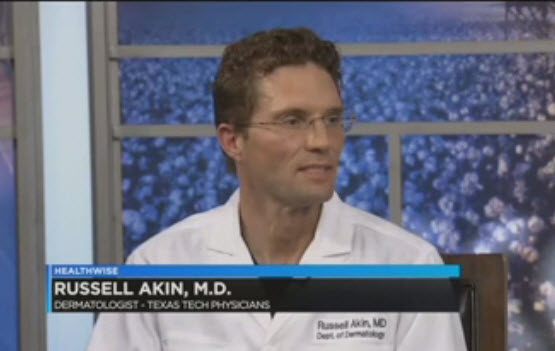How your hairdresser could save your life

Your hairdresser could save your life, by finding something on your scalp you would never look for.
That's the advice from Dr. Russell Akin, a dermatologist and Texas Tech Physician. He says most people think that a full head of hair can protect us from the sun, but that's not the case.
He says, "The scalp is actually a really common place that we do see skin cancer, more commonly on balding men but anybody, even with a full head of hair can develop a skin cancer on the scalp. There's a lot of value in having a hairdresser over the long run who sees your scalp more frequently than a physician."
Dr. Akin says just by washing and styling your hair once a week, a hairdresser will be more likely to notice changes or any new lesions that pop up. Often, he says skin cancer is not something we feel, but something we see. So, he says the best guideline is to follow the ABCDE rules of melanoma.
A stands for Asymmetry. He explains, "If you divide a line down the center, it's not the same on both sides."
B stands for Borders. "Borders that are notched or irregular. So think of it as a Mickey Mouse hat as an irregular lesion.
C means color variation. "So we can see red, white, blue, black and brown all in melanoma so it can be a variety of different colors. but the more common is brown, or dark brown or black."
D means look for a diameter that is greater than a pencil eraser.
E means any spot that is Evolving or changing over time.
Dr. Akin says if you see anything that follows those ABCDE warning signs, you should take your concern to a doctor.
Specifically, he adds, "If something doesn't heel in 2 or 3 weeks, a new spot that pops up, bleeds or oozes, gets scaly and doesn't go away, that's something that you need to check out."
There are other common spots where skin cancer likes to hide.
Dr. Akin says, "We can see melanoma in the back of the eye although usually in patients who have had a previous melanoma. We can see melanomas that develop in the hands and the feet."
But, he adds that is more common in people with pigmented skin, like African American or Hispanics.
Overall, he says check yourself once a month and have somebody look at your back and your scalp.
That doesn't take long at all.
And if your friend or hairdresser notices something suspicious, that little spot brought to your attention might have just saved your life.
Related Stories
Celebrating Veterans: TTUHSC’s General Martin Clay’s Legacy of Service and Leadership
From his initial enlistment in the Army National Guard 36 years ago to his leadership in military and civilian health care management roles, Major General Martin Clay’s career has been shaped by adaptability, mission focus and service to others.
Texas Tech University Health Sciences Center School of Nursing Named Best Accelerated Bachelor of Science in Nursing Program in Texas
The TTUHSC School of Nursing Accelerated Bachelor of Science in Nursing (BSN) program has been ranked the No. 1 accelerated nursing program in Texas by RegisteredNursing.org.
TTUHSC Names New Regional Dean for the School of Nursing
Louise Rice, DNP, RN, has been named regional dean of the TTUHSC School of Nursing on the Amarillo campus.
Recent Stories
National Academy of Inventors Names TTUHSC Faculty Senior Members
The National Academy of Inventors (NAI) has designated two current and one former TTUHSC faculty researchers as Senior Members.
The John Wayne Cancer Foundation Surgical Oncology Fellowship Program at Texas Tech University Health Sciences Center Announced
TTUHSC is collaborating with the John Wayne Cancer Foundation and has established the Big Cure Endowment, which supports the university’s efforts to reduce cancer incidence and increase survivability of people in rural and underserved areas.
TTUHSC Receives $1 Million Gift from Amarillo National Bank to Expand and Enhance Pediatric Care in the Panhandle
TTUHSC School of Medicine leaders accepted a $1 million philanthropic gift from Amarillo National Bank on Tuesday (Feb. 10), marking a transformational investment in pediatric care for the Texas Panhandle.
